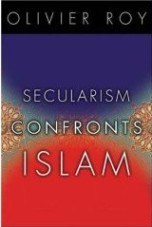The Archbishop of Canterbury today warns politicians not to interfere with a Muslim woman’s right to wear the veil in public and cautions against a march towards secularism in British society.
In a dramatic intervention Dr Rowan Williams, who is backed by other senior church leaders, said that the Government must not become a “licensing authority” that decides which religious symbols are acceptable.
Writing in The Times he adds that any ban on the veil would be “politically dangerous”. His comments reflect concern within the Church that some members of the Government want to see Britain follow the same route as France, where secularism is close to being a national religion.
“The ideal of a society where no visible public signs of religion would be seen – no crosses round necks, no sidelocks, turbans or veils – is a politically dangerous one,” he writes. “It assumes that what comes first in society is the central political ‘licensing authority’, which has all the resource it needs to create a workable public morality.”
But secularists said that the Archbishop was misguided. Terry Sanderson, of the National Secular Society, said: “The way we are going in this country with the rise of Islam, the churches should look at secularism as their best friend.”
Sanderson’s comment is of course entirely in line with the Islamophobic approach of the NSS, who happily formed an alliance with the evangelical Christian right in a campaign against the Racial and Religious Hatred Bill, the primary purpose of which was to defend Muslims against incitement to hatred.
In January 2004, in the NSS Newsline, Sanderson wrote: “Secularism is under sustained threat from a resurgent Islam – and not just in France. In this country, too, it is becoming difficult to even discuss minority religions in critical terms without landing in trouble. We need to resist.”

 The
The